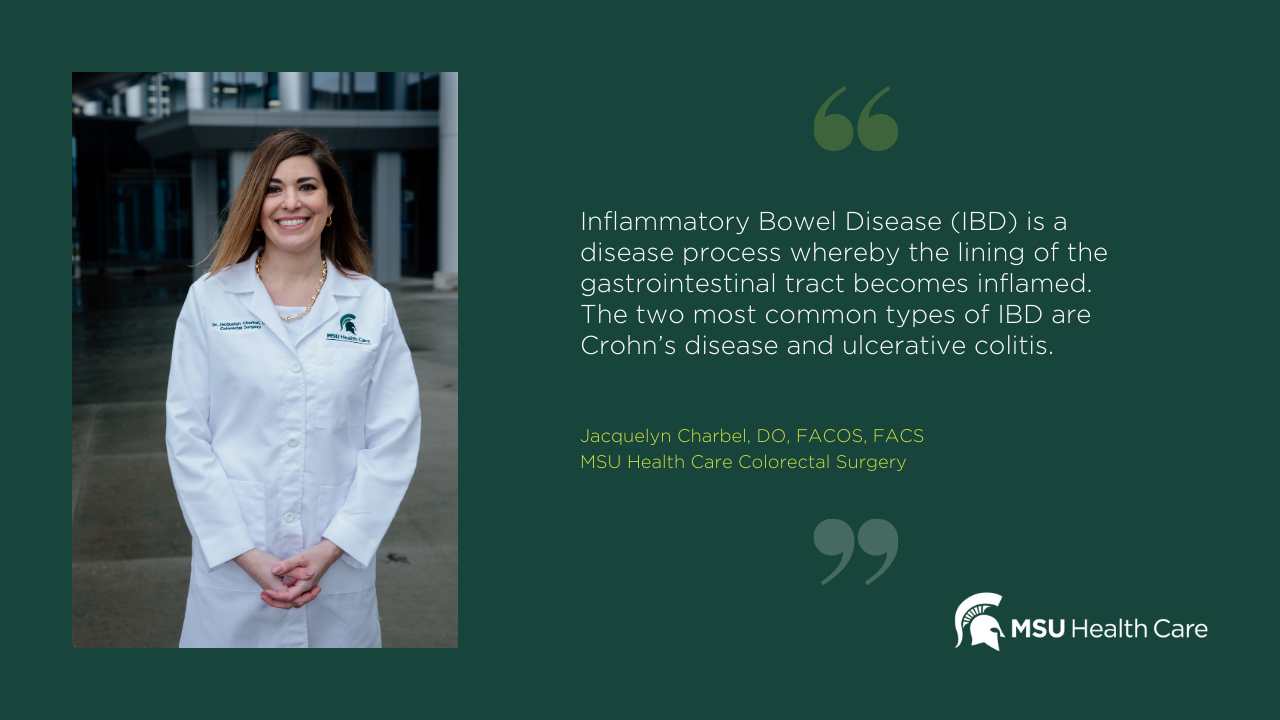Ask the Expert: Navigating Crohn’s Disease
May 18, 2023

May 19 is World Inflammatory Bowel Disease (IBD) Day. Jacquelyn Charbel, DO, FACOS, FACS, is an assistant professor in the Michigan State University College of Osteopathic Medicine and provides care as a colorectal surgeon at MSU Health Care. She discusses Crohn’s disease, its risk factors, and how it can be treated.
What is Crohn’s disease?
Crohn’s Disease is an auto-immune process whereby the body attacks its own tissue. In Crohn’s Disease, this process primarily involves the gastro-intestinal system. This includes the mouth, esophagus, stomach, small intestine, large intestine (colon), rectum and anus. It is seen in every population around the globe.
What is the difference between inflammatory bowel disease, Crohn’s disease, and ulcerative colitis?
Inflammatory Bowel Disease (IBD) is a disease process whereby the lining of the gastrointestinal tract becomes inflamed. The two most common types of IBD are Crohn’s disease and ulcerative colitis. Crohn’s Disease can cause fibrosis, stricture (narrowing), inflammation, and fistulization (communicating channels between gastro-intestinal organs or to the skin). Ulcerative colitis typically involves the colon and rectum, whereas Crohn’s Disease can involve any location (or multiple locations) within the gastro-intestinal tract.
What are some risk factors for Crohn’s disease?
Risk factors for Crohn’s Disease are predominately genetic. If your relatives had the disease, you are more likely than average to have the disease occur at some point during your life. However, many people with inflammatory bowel disease do not have a family history of the disease. The patients typically have experienced a spontaneous genetic mutation leading to their pathology. There are several hundred genetic loci that can lead to Crohn’s Disease if the genes experience a mutation during the replication cycle. One recent discovery is a protein called Complement Factor B. This protein has been shown to lose function when a genetic mutation occurs during replication. Loss of function of Complement Factor B protein leads to fistulizing disease of the anorectal region, which is commonly seen with Crohn’s Disease.
How are patients diagnosed?
Patients are typically diagnosed through symptoms they experience, such as bloody stools, nausea, inability to tolerate foods, and unintentional weight-loss. These symptoms will prompt a work-up typically including an upper endoscopy (esophagogastroduodenoscopy), colonoscopy, and possibly an MRE (magnetic resonance enterography) followed by specific labwork.
What are the treatment options?
Treatment options begin with your Gastroenterologist, who is a physician specializing in the gastrointestinal tract. They can discuss medical management options to control symptoms and the severity of disease to potentially avoid surgery if possible. MSU Health Care provides gastroenterology care at MSU Health Care Gastroenterology. Some people do not respond to medical therapy, and ultimately require surgery in severe cases.
What can patients do to prevent Crohn’s disease?
The best thing a person can do is to maintain a healthy lifestyle including exercise, limiting processed sugar intake, getting enough sleep, drinking plenty of water, and avoid smoking and alcohol. Avoid vaping/e-cigarettes. Recent studies from The University of California – San Diego have shown vaping compromises the gut barrier and triggers inflammation of the gastro-intestinal lining, which is bad in general and worse if a person already has Crohn’s Disease or ulcerative colitis (1). Minimizing your stress levels also helps prevent flairs of the autoimmune diseases. You cannot control the genes you inherit, but you can choose to live a healthy life allowing for a healthy baseline.
What would you like patients to know?
There are other manifestations of Inflammatory Bowel Syndrome, such as erythema nodosum (rashes along the lower legs), uveitis and episcleritis, (inflammation of a particular parts of the eye), pyoderma gangrenosum (painful weeping sores of the skin), Sweet Syndrome (sudden painful rash along the arms, legs, chest/abdomen, face and is associated with fever). Sweet Syndrome is also known as acute febrile neutrophilic dermatosis, and is sometimes seen in pregnancy, gastrointestinal infections, or malignancy.
Anything else?
The most important take-home points are:
- Don’t smoke/vape
- Limit stress
- Get checked by your provider if you are experiencing the symptoms described above.
- “E-cigarettes compromise the gut barrier and trigger inflammation” by Aditi Sharma, Jasper Lee, Ayden G. Fonseca, Alex Moshensky, Taha Kothari, Ibrahim M. Sayed, Stella-Rita Ibeawuchi, Rama F. Pranadinata, Jason Ear, Debashis Sahoo, Laura E. Crotty-Alexander, Pradipta Ghosh and
Soumita Das, 5 January 2021, iScience.
DOI: 10.1016/j.isci.2021.102035

